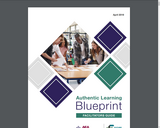
Tools and Ideas for educators who want to provide more authentic learning opportunities to kids.
- Subject:
- Business and Communication
- Career and Technical Education
- Material Type:
- Reading
- Author:
- Stephanie Lane
- Laura Williams
- Date Added:
- 09/11/2019

Tools and Ideas for educators who want to provide more authentic learning opportunities to kids.
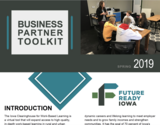
The Iowa Clearinghouse for Work-Based Learning is a virtual tool that will expand access to high-quality, in-depth work-based learning in rural and urban communities for all students, especially traditionally underrepresented students, with a focus on high demand STEM fields and careers. School-business partnerships will be created and developed through projects that make learning more relevant and authentic for students as well as also meeting the needs of the businesses.
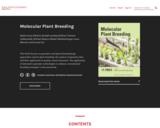
Short Description:
This book focuses on genomics and plant biotechnology approaches used in plant breeding, the analysis of genomic data, and their application in quality control measures. The application of alternative genomic technologies to enhance conventional breeding strategies is also presented.
Long Description:
This book focuses on genomics and plant biotechnology approaches used in plant breeding, the analysis of genomic data, and their application in quality control measures. The application of alternative genomic technologies to enhance conventional breeding strategies is also presented.
Word Count: 78625
(Note: This resource's metadata has been created automatically by reformatting and/or combining the information that the author initially provided as part of a bulk import process.)
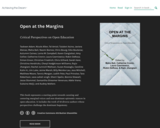
Critical Perspectives on Open Education
Short Description:
This book represents a starting point towards curating and centering marginal voices and non-dominant epistemic stances in open education. It includes the work of 43 diverse authors whose perspectives challenge the dominant hegemony.
Long Description:
Open education is at a critical juncture. It has moved on from its northern roots and is increasingly being challenged from its own periphery. At the same time, it finds itself marginalised and under threat in an educational sector infiltrated by corporate interests. However, rather than bunkering down, becoming blinkered or even complacent, the editors of this volume believe that the voices from the periphery should be amplified. This book represents a starting point towards curating and centering marginal voices and non-dominant epistemic stances in open education, an attempt at critical pluriversalism. It is a curated collection of 38 blog posts, lectures, talks, articles, and other informal works contributed by 43 diverse authors/co-authors and published since 2013. Each of these contributions offers a perspective on open education that can be considered marginal and that challenges the dominant hegemony.
Word Count: 3186
(Note: This resource's metadata has been created automatically by reformatting and/or combining the information that the author initially provided as part of a bulk import process.)
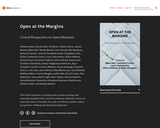
Critical Perspectives on Open Education
Short Description:
This book represents a starting point towards curating and centering marginal voices and non-dominant epistemic stances in open education. It includes the work of 43 diverse authors whose perspectives challenge the dominant hegemony.
Long Description:
Open education is at a critical juncture. It has moved on from its northern roots and is increasingly being challenged from its own periphery. At the same time, it finds itself marginalised and under threat in an educational sector infiltrated by corporate interests. However, rather than bunkering down, becoming blinkered or even complacent, the editors of this volume believe that the voices from the periphery should be amplified. This book represents a starting point towards curating and centering marginal voices and non-dominant epistemic stances in open education, an attempt at critical pluriversalism. It is a curated collection of 38 blog posts, lectures, talks, articles, and other informal works contributed by 43 diverse authors/co-authors and published since 2013. Each of these contributions offers a perspective on open education that can be considered marginal and that challenges the dominant hegemony.
Word Count: 83220
ISBN: 978-1-989014-22-6
(Note: This resource's metadata has been created automatically by reformatting and/or combining the information that the author initially provided as part of a bulk import process.)
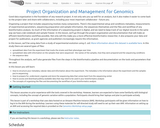
Data Carpentry Genomics workshop lesson to learn how to structure your metadata, organize and document your genomics data and bioinformatics workflow, and access data on the NCBI sequence read archive (SRA) database. Good data organization is the foundation of any research project. It not only sets you up well for an analysis, but it also makes it easier to come back to the project later and share with collaborators, including your most important collaborator - future you. Organizing a project that includes sequencing involves many components. There’s the experimental setup and conditions metadata, measurements of experimental parameters, sequencing preparation and sample information, the sequences themselves and the files and workflow of any bioinformatics analysis. So much of the information of a sequencing project is digital, and we need to keep track of our digital records in the same way we have a lab notebook and sample freezer. In this lesson, we’ll go through the project organization and documentation that will make an efficient bioinformatics workflow possible. Not only will this make you a more effective bioinformatics researcher, it also prepares your data and project for publication, as grant agencies and publishers increasingly require this information. In this lesson, we’ll be using data from a study of experimental evolution using E. coli. More information about this dataset is available here. In this study there are several types of files: Spreadsheet data from the experiment that tracks the strains and their phenotype over time Spreadsheet data with information on the samples that were sequenced - the names of the samples, how they were prepared and the sequencing conditions The sequence data Throughout the analysis, we’ll also generate files from the steps in the bioinformatics pipeline and documentation on the tools and parameters that we used. In this lesson you will learn: How to structure your metadata, tabular data and information about the experiment. The metadata is the information about the experiment and the samples you’re sequencing. How to prepare for, understand, organize and store the sequencing data that comes back from the sequencing center How to access and download publicly available data that may need to be used in your bioinformatics analysis The concepts of organizing the files and documenting the workflow of your bioinformatics analysis
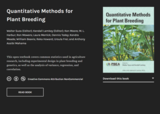
This open textbook covers common statistics used in agriculture research, including experimental design in plant breeding and genetics, as well as the analysis of variance, regression, and correlation.
Each of the books in the PBEA series comes with a section in its back matter titled "Applied Learning Activities" which includes additional content aligned to each chapter such as handouts and worksheets, csv files, code for statistical analysis in R, and recommended readings.
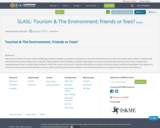
This unit includes 4 lessons where in Biology, students design a proposal or program to help the environment at a tourist location and in Math, students will calculate how tourism affects the economy.
Using inquiry-based reading, students will explore an anchor text and then develop their own essential and supporting questions to guide their research.
Over the course of the unit, students will explore a variety of texts and grow in their knowledge of the impact of tourism on the environment and the economy. They will also grow in their ability to use informational text to support their inquiry and research.